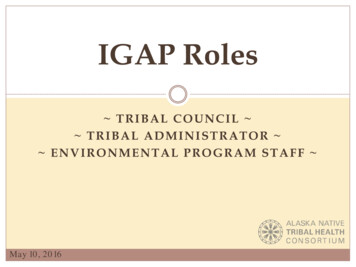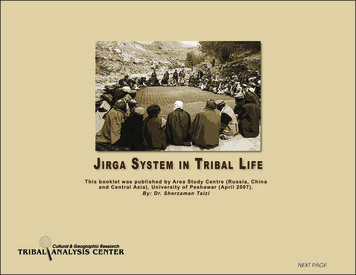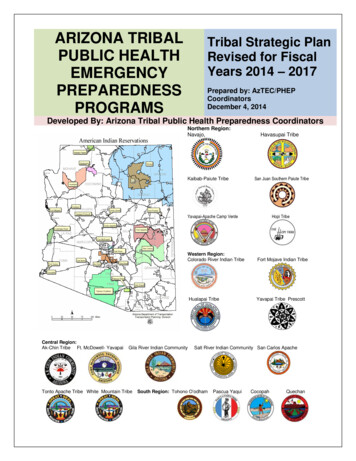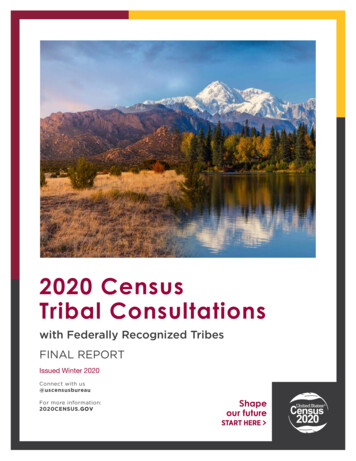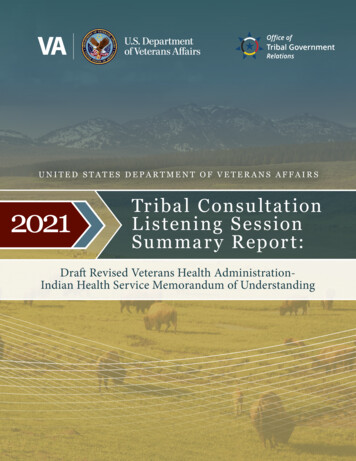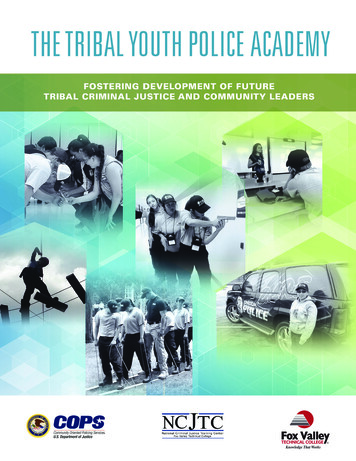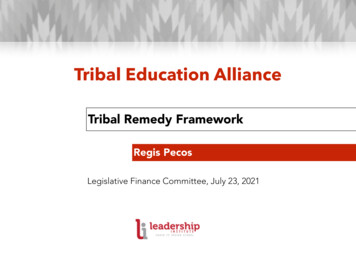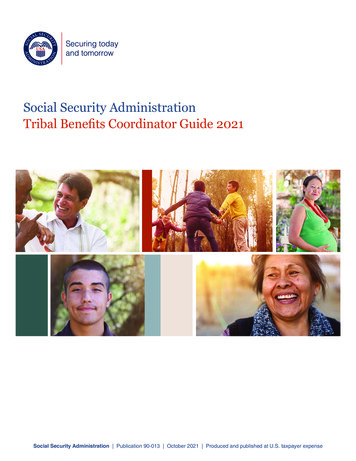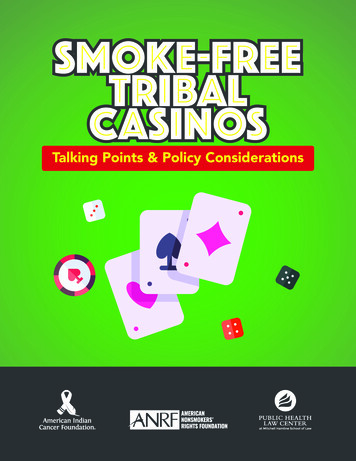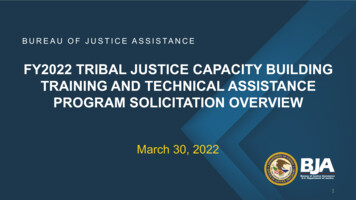
Transcription
B U R E A U O F J U S T I C E A S S I S TA N C EFY2022 TRIBAL JUSTICE CAPACITY BUILDINGTRAINING AND TECHNICAL ASSISTANCEPROGRAM SOLICITATION OVERVIEWMarch 30, 20221
PresenterJulius C. Dupree, Jr.Policy Advisor, Bureau of Justice AssistanceEmail: Julius.Dupree@usdoj.govMobile Phone: (202) 598-94952
Bureau of Justice Assistance (BJA)To enforce the law and defend theinterests of the United States accordingto the law; to ensure public safetyagainst threats foreign and domestic;to provide federal leadership inpreventing and controlling crime; toseek just punishment for those guilty ofunlawful behavior; and to ensure fairand impartial administration of justicefor all Americans.BJA’s mission is to provide leadershipand services in grant administrationand criminal justice policy developmentto support state, local, and tribal justicestrategies to achieve safercommunities. BJA works withcommunities, governments, andnonprofit organizations to reducecrime, recidivism, and unnecessaryconfinement, and promote a safe andfair criminal justice system.
Tribal Corrections Capacity Building Trainingand Technical Assistance Program (TCCB TTA)The TCCB TTA Program is acomprehensive approach to deliveringtraining and technical assistance onstrategies to strengthen tribal correctionalsystem capacity in order to enhancepublic safety and facilitate successfulcommunity reintegration efforts.4
Eligible Applicants For profit organizations other than small businesses Native American tribal organizations (other than federallyrecognized tribal governments) Nonprofits having a 501(c)(3) status with the IRS, other thaninstitutions of higher education Nonprofits that do not have a 501(c)(3) status with the IRS, otherthan institutions of higher education Private institutions of higher education Public and state-controlled institutions of higher education Other5
Additional Eligibility RequirementsTo advance Executive Order 13929 Safe Policing for Safe Communities, the Attorney Generaldetermined that all state, local, and university or college law enforcement agencies must becertified by an approved independent credentialing body or have started the certification process,to be eligible for FY 2022 DOJ discretionary grant funding. To become certified, the lawenforcement agency must meet two mandatory conditions: (1) the agency’s use-of-force policiesadhere to all applicable federal, state, and local laws and (2) the agency’s use-of-force policiesprohibit chokeholds except in situations where use of deadly force is allowed by law. Thecertification requirement also applies to law enforcement agencies receiving DOJ discretionarygrant funding through a subaward. For detailed information on this certification requirement,please visit https://cops.usdoj.gov/SafePolicingEO to access the Standards for Certification onSafe Policing for Safe Communities, the Implementation Fact Sheet, and the List of DesignatedIndependent Credentialing Bodies.6
Additional Eligibility RequirementsBJA will consider applications under which two or more entities wouldcarry out the federal award; however, only one entity may be theapplicant. Any others must be proposed as subrecipients(subgrantees).For additional information on subawards, see the OJP GrantApplication Resource Guide.7
Current TCCB TTA services scope focuses oncommunity supervision and reentry Tribal Probation Academy to provide training to new tribal probation officers Intermediate training opportunities on evidence-based community supervisionpractices Ad hoc technical assistance to support community supervision capacity building Tribal Intergovernmental Reentry Workshop to provide participants with the toolsthey need to develop effective reentry plans Ad hoc technical assistance to support the implementation of effectivecommunity reintegration strategies8
FY 22 TCCB TTA Program focuses on three components of thecorrections continuum123Institutional CorrectionsCommunity Corrections/SupervisionReentryPlan, implement, or enhanceeffective, culturally competentpractices and programmingAddress community supervisiontraining needs and practicesPlan, implement, or enhancereentry programming strategiesfor tribal communities9
ObjectivesSupport tribes that receivecompetitive grants under PurposeArea 3 of the Coordinated TribalAssistance Solicitation (CTAS)that focus on institutional andcommunity corrections andreentry from incarcerationDevelop and deliver training, peerlearning opportunities, and otherresources to the tribal justice fieldon institutional and communitycorrections and reentry fromincarceration into Indian Country10
DeliverablesIndividualized, efficient,and consistent delivery ofTTA in order to get CTASPurpose Area 3 granteesto accomplish their goalsby the end of their projectperiods.Develop individualized TTA work plans for eachgrantee based on the grantee’s goals outlined inthe funded application.The selected TTAproviders must undertakeefforts to anticipate, quicklyidentify, and addresschallenges that ariseduring TTA delivery.Assign each grantee a TTA coach to assessand identify grantee TTA needs.All training provided withBJA funding must providea mechanism for pre- andpost-testing of knowledgeand other assessment ofimpact.11
DeliverablesTTA provider staff will havesufficient subject expertise toassist grantees in the executionof their projects. The staffshould have the necessarytechnical skill sets andexperience to effectively beable to coach grantees andassist them in reaching theirgoals.There are occasions wherean external expert will berequired. To this end, the TTAprovider must utilize a rangeof vetted tribal and/or nationalsubject experts, includingpractitioners, academics, andfederal partners.As part of this oversight ofstaff and experts, the TTAprovider must document aplan to ensure that it has a setof diverse staff, trainers,and/or subject matter expertsthat reflect a mix ofexperiences andperspectives.12
DeliverablesThe TTA providermust participate inongoingcollaboration andcoordination.Coordination in tribal jurisdictions.Coordinationacross interestgroups.Coordination with federalpartners.13
DeliverablesThe TTA provider shouldprioritize responses torequests from practitionersand assist unfundedapplicants, in consultationwith BJA.Maintain a listserv ofgrantees, subgrantees,and key contactsresponsible for undertakinggrant and related activities,including interested tribal,state, and local contacts,and federal and nationalpartners.14
DeliverablesThe TTA provider mustserve as a thoughtleader and informationclearinghouse forrelevant research andbest practices.Create knowledge diffusion products(e.g., fact sheets, webinars) anddisseminate them through BJA’snetworks.Disseminate bestpractices and lessonslearned by attending andpresenting at national,state, local, tribal, or otherconferences and events.Convene grantee learningcommunities, based on their respectiveprojects/programs, to explore bestpractices and lessons learned.15
DeliverablesAssist grantees in the collection of performance measure data forsubmission to the Performance Measurement Tool.The TTA provider mustproactively build fieldknowledge andcapacity in the area oftribal corrections.Based on performance reporting trends and TTA needs assessments,propose to and work with BJA on tailoring the TTA strategy to meetemerging needs and trends.16
Priority considerations Advancing Racial Equity and Support forUnderserved CommunitiesA. Requires applicant toPriority consideration to applications thataddress in programinclude project(s) that will promote racialequity and the removal of barriers to accessnarrative attachmentand opportunityB. Priority consideration to applicants that candemonstrate that their capabilities andcompetencies for implementing proposedproject are enhanced because the applicantidentifies as culturally specific organization See solicitation forculturally specificorganization definitiong17
Award Information1 awardUp to 1M24 monthsPeriod of Performance Start Date: 10/01/2022Continuation of Funding Intent: BJA may, in certain cases, provide additionalfunding in future years to awards18
Application InformationThe following application elements must be included in the application tomeet the basic minimum requirements to advance to peer review andreceive consideration for funding: Proposal Abstract Proposal Narrative Budget Worksheet and Budget Narrative (web-based form). The webbased form includes the budget details and the budget narrative. Timeline/Project Task Plan Documentation of Proposed Subrecipients (if any) Résumés of Key Personnel Work Product Examples19
Application Review CriteriaSelection CriteriaWeightStatement of the problem10%Project design and implementation40%Capabilities and competencies35%Plan for collecting data for the solicitation’sperformance measures and sustainability plans5%Budget10%20
How to Apply: Grants.gov and JustGrantsDual Deadlines Step 1: The applicant will submit the SF-424 and SF-LLL in Grants.govat https://www.grants.gov/web/grants/register.html by May 11,2022 at 8:59 pm EDT. Step 2: The applicant will then submit the full application, includingattachments, in JustGrants in JustGrants.usdoj.gov by May 23, 2022at 8:59 pm EDT.Read the solicitation carefully for further guidance.21
Application AssistanceGrants.gov Provides technical assistance with submitting the SF-424 and SF-LLL. Customer Support Hotline – 800-518-4726 or 606-545-5035 Operates 24 hours a day, 7 days a week, except on federal holidays. Email https://www.grants.gov/web/grants/support.html support@grants.govProvides information on available federal funding opportunities for various federalagencies.
Unique Entity Identifiers (UEI) Transition Upcoming federal government transition from Data Universal Numbering System (DUNS) to SAM UEI on April 4,2022. Grants.gov will transition to UEI at 11:59 p.m. ET on March 31, 2022. To support this transition, DOJ will update all posted Grants.gov funding opportunity packages to reflect the useof UEI. The March 9, 2022, JustGrants News & Updates Important Updates About SAM UEI Transition and DOJ FundingOpportunities message includes important information about the transition and actions that entities must takewhen applying for funding opportunities with a Grants.gov close date after March 31, 2022. All entities applying for DOJ funding opportunities that have a Grants.gov close date after March 31, 2022, musttake one of the following actions:1) Complete and submit the SF-424 and SF-LLL no later than March 30, 2022, at 8:00 p.m. ET2) Wait until April 1, 2022, to begin and submit the Grants.gov application
JustGrants Offers a streamlined, end-to-end process, enabling applicantsand grantees to move seamlessly through the full grantsmanagement life cycle Gives applicants and award recipients new ways to managetheir own entity information and that of users in the system24
Application Submission Identify the forms needed to submit an application. Complete a web-based budget form. Complete an application, including certifying theinformation. Submit the application.25
JustGrants SupportAccess tutorials andsign up for trainingalerts.Learn more about DOJ’sgrants management andfinancial systems.https://justicegrants.usdoj.gov26
Application Assistance (cont.)JustGrants Technical Support Provides technical assistance with submitting the full application in DOJ’s Justice GrantsSystem (JustGrants). Customer Support Hotline – 833-872-5175 Monday – Friday between 5:00 AM and 9:00 PM EST. Saturday, Sunday, and Federal holidays from 9:00 AM – 5:00 PM EST. Email https://justicegrants.usdoj.gov/user-support JustGrants.Support@usdoj.gov
Application Assistance and Support (cont.)OJP Response Center Provides solicitation support and general assistance.email - grants@ncjrs.govweb chat - https://webcontact.ncjrs.gov/ncjchat/chat.jsptoll free at 800–851–3420;TTY at 301–240–6310 (hearing impaired only)The Response Center hours of operation are 10:00 a.m. to 6:00 p.m. eastern time, Monday through Friday.Subscribe Subscribe to receive email notifications of new funding opportunities and other resources.– Sign-up to receive the twice monthly JUSTINFO newsletter as well as the weekly Funding News email.– Subscribe at https://www.ojp.gov/subscribe and be sure to select “Grants/funding” as an area of interest.
Additional Resources OJP Funding Resource Centerhttps://ojp.gov/funding/index.htm DOJ Grants Financial Guidehttps://ojp.gov/financialguidedoj/overview DOJ Grants Financial Management Online agement-training OJP Grant Application Resource -App-Resource-Guide.htm National Institute of Justice’s CrimeSolutions.govhttps://www.CrimeSolutions.gov29
Additional ResourcesBJA Grant Applicant Education Series Funding Opportunities for Your Community in 2022: AnOverview of What’s Ahead The Funding Process: First Steps to Applying, How to PrepareNow, and Other ConsiderationsPDFs of the presentations and transcripts are available athttps://www.bja.gov/funding/webinars.html30
Additional ResourcesUpcoming webinar:BJA Funding and Resources – Corrections, Reentry, andReformDate/Time: March 31, 2022, 1 p.m. ET31
Stay ConnectedEmail Updates Text OJP [your email address] to 468-311 to subscribe.*Message and data rates may apply.Social Media Facebook: https://www.facebook.com/DOJBJA Twitter: https://twitter.com/DOJBJAFor information on funding opportunities, publications, and initiatives, visitBJA’s website – https://bja.ojp.gov
Quick Reference: Important ContactsSolicitation Content Assistance1-800-851-3420Grants@ncjrs.gov10-6 EST, M-FSubmit the SF-424 and SF- LLL1-800-518-4726Support@grants.gov24 hours a day, 7 days a weekSubmit full gov5-9 EST, M-F9-5 EST, Weekends, Holidays33
Questions?Enter in the Q&A box and send to All Panelists34
BJA's mission is to provide leadership and services in grant administration and criminal justice policy development to support state, local, and tribal justice strategies to achieve safer communities. BJA works with communities, governments, and nonprofit organizations to reduce crime, recidivism, and unnecessary
